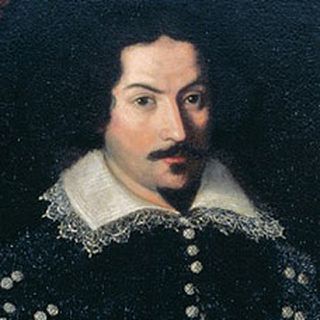
Carlo Maderno (Maderna) was an Italian architect, born in today's Ticino, who is remembered as one of the fathers of Baroque architecture. His façades of Santa Susanna, St. Peter's Basilica and Sant'Andrea della Valle were of key importance in the evolution of the Italian Baroque. He is often referred to as the brother of sculptor Stefano Maderno, but this is not universally agreed upon.

Casale Monferrato is a town in the Piedmont region of Italy, in the province of Alessandria. It is situated about 60 km (37 mi) east of Turin on the right bank of the Po, where the river runs at the foot of the Montferrat hills. Beyond the river lies the vast plain of the Po valley.
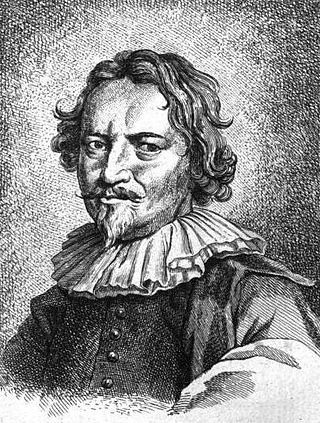
Carlo Fontana (1634/1638–1714) was an Italian architect originating from today's Canton Ticino, who was in part responsible for the classicizing direction taken by Late Baroque Roman architecture.

Santa Maria della Pace is a church in Rome, central Italy, not far from Piazza Navona. The building lies in rione Ponte.

Pacentro is a comune of 1,279 inhabitants of the province of L'Aquila in Abruzzo, Italy. It is a well-preserved historic medieval village located in central Italy, several kilometers from the City of Sulmona about 170 kilometres (110 mi) east of Rome. It is a member of the I Borghi più belli d'Italia association.

San Carlo ai Catinari, also called Santi Biagio e Carlo ai Catinari, is an early-Baroque style church in Rome, Italy. It is located on Piazza Benedetto Cairoli, 117 just off the corner of Via Arenula and Via dei Falegnami, a few blocks south of the church of Sant'Andrea della Valle.

Verolengo is a comune (municipality) in the Metropolitan City of Turin in the Italian region Piedmont, located about 25 kilometres (16 mi) northeast of Turin.

Santa Maria in Campitelli or Santa Maria in Portico is a church dedicated to the Virgin Mary on the narrow Piazza di Campitelli in Rione Sant'Angelo, Rome, Italy. The church is served by the Clerics Regular of the Mother of God.
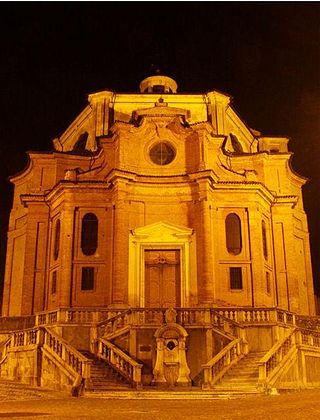
Bernardo Antonio Vittone was an Italian architect and writer. He was one of the three most important Baroque architects active in the Piedmont region of Northern Italy; the other two were Filippo Juvarra and Guarino Guarini. The youngest of the three, Vittone was the only one who was born in Piedmont. He achieved a synthesis of the spatial inventiveness of Juvarra and the engineering ingenuity of Guarini, particularly in the design of his churches, the buildings for which he is best known.

Padua Cathedral, or Basilica Cathedral of Saint Mary of the Assumption, is a Catholic church and minor basilica located on the east end of Piazza Duomo, adjacent to the bishop's palace in Padua, Veneto, Italy.

San Macuto is a Catholic church located on Piazza di San Macuto in the Colonna rione of Rome, Italy. Located next to the Jesuit Collegio di San Roberto Bellarmino in the Palazzo Gabrielli-Borromeo, it is the only church in Italy dedicated to the 7th century Breton saint Malo.

Montisi is an Italian village in the municipality of Montalcino, Province of Siena, Tuscany. It sits on a hill on the boundary between the Val d'Orcia and the Crete Senesi.

Santa Maria Assunta is a Renaissance church in Genoa, Italy. It is located in a residential sector called Carignano located on the hills just above the city center, thus the church is also known as Santa Maria Assunta di Carignano.

Santa Sofia is a Roman catholic church located in the Piazza of Anacapri, on the island of Capri, Italy. It dates to 1596 when it replaced Chiesa di Santa Maria di Costantinopoli as the parish church. Some of the building materials and fittings, such as the sacristy and oratorio, were originally in the Chiesa di San Carlo. The church chapels are dedicated to Sant'Antonio, Anacapri's patron saint, and the Madonna del Buon Consiglio. Architectural features include two bell towers and a baroque facade. The wedding of Guiliana DePandi and Bill Rancic occurred at the Chiesa di Santa Sofia.
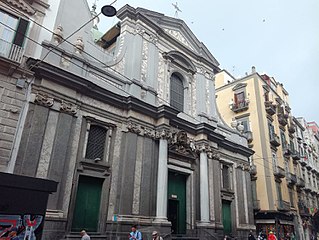
The church of St. Nicholas the Charitable is a church located on via Toledo, almost midway between Piazza Carità and Piazza Dante in Naples, Italy.

The Church of Saint Teresa of Ávila is a Baroque-style church located on Via Santa Teresa, near Piazza San Carlo in Turin, Italy.

San Filippo Neri is a late-Baroque style, Roman Catholic church located in Turin, region of Piedmont, Italy. The church is located on Via Maria Vittoria 5; the left flank of the nave faces the Turin Academy of Sciences. The church is still used for services. 69 metres (226 ft) long and 37 metres (121 ft) wide, it is the largest church in the city of Turin.

Santa Cristina is a Baroque style, Roman Catholic church located in Turin, region of Piedmont, Italy. It mirrors the adjacent church of San Carlo and faces the Piazza San Carlo. The arrangement recalls the twin churches of Santa Maria dei Miracoli (1681) and Santa Maria in Montesanto (1679) facing the Piazza del Popolo in Rome.

The Church of Saint Teresa is a Baroque Roman Catholic church, located on Piazza della Kalsa, facing the Porta de Greci in the ancient quarter of the Kalsa of the city of Palermo, region of Sicily, Italy.
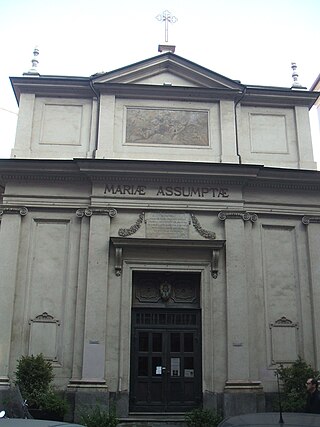
Santa Maria di Piazza is a late-Baroque-style church located on via Santa Maria near Via Garibaldi in Central Turin, region of Piedmont, Italy. The church was among the last designs by Bernardo Vittone.





















